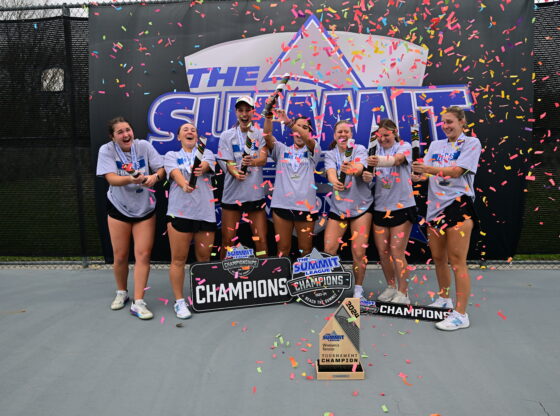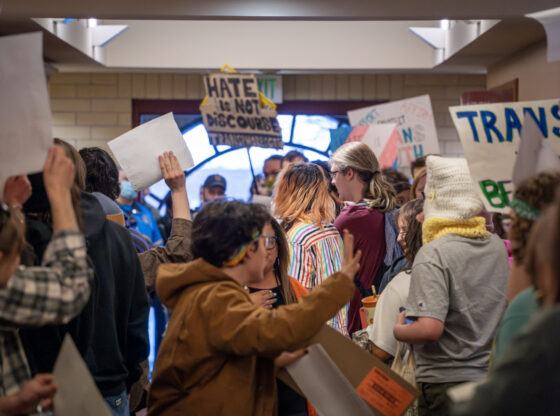After making its way through Asia and Europe, America gets its first case of COVID-19. The virus then creeps toward Colorado, prompting a slew of emails from Chancellor Haefner’s office. Coloradans raid grocery stores, causing an apocalyptic shortage of toilet paper, disinfectant wipes and pasta. Finally, the virus is here. People wear masks and rubber gloves. As cases rise, DU closes up shop and goes online for the entirety of spring quarter.
With the whole state of Colorado under a stay-at-home order, it’s obvious this quarter will look different. How will STEM labs operate? What will happen to music students required to participate in ensembles every quarter? How will professors learn how to teach their classes online in just over a week? These are the questions, among many others, I explore in my new column, “COVID-19 on Campus.”
Some of the most negatively affected sets of majors on campus are music, theatre and art.
Plastered all over social media lay the diary entries of musicians cheering up others in quarantine or artists hosting Instagram Live painting tutorials. With so many status updates and articles about how people are productively spending their time in social isolation, it’s difficult to see how the arts industry is buckling under the torrential weight of distance.
In a series of interviews, DU students in the creative arts discussed issues with online school, housing/employment and access to studios and gigs, which have been entirely obstructed due to COVID-19’s stay-at-home orders and social distancing measures.
“I think it’s literally impossible to be a music major and be online,” said Camila Vaitaitis, a second-year graduate student in jazz composition. “They should let us take this quarter off and just finish it up when school reopens physically, [because] being a composition major and not having anyone to play your compositions is worthless.”
Like Vaitaitis, fine arts students have considered or already taken drastic measures to compensate for educational losses. Unlike many other students, their studies rely solely on being with other people. While music students are required to enroll in one or two ensembles per quarter to graduate, seniors in theatre have to produce an entire mini-play in their Spring Quarter—their Capstone project. Art students rely on facilities and supplies for their degrees.
Some seniors are considering deferring this quarter and finishing their degree in the fall when they have access to people and resources. Many music students specifically have unenrolled from every degree class other than required ensembles since they feel music cannot be taught online.
“I don’t think any of us would continue if we didn’t have classes we had to take for our major,” said Carl Berner, a third-year jazz saxophone performance major. “I’m pretty sure all of us would choose not to pay for the quarter because it’s so necessary that we’re with other people for our classes. I think all of us are only doing this because we need to graduate.”
How do you teach live arts like music and theatre online? We can all imagine the comical scene that would result from a 50-member symphonic orchestra attempting to rehearse via Zoom. Even non-performance courses are suffering; faculty members can’t teach screen-printing without expensive equipment, and theatre movement classes are rendered useless without the ability to physically interact with other students.
Although DU is mailing art majors some equipment to create remote projects, fourth-year theatre students cannot perform any kind of Capstone project and will most likely be asked to do a research paper.
“A lot of seniors use it [the Capstone project] for grad school applications or film it to use for different things, so it is rough,” stated Gracie Jacobson, a third-year theatre major. “It’s the same with the designers and actors––everybody puts it on their resume.”
In addition, some faculty members are asking music students to independently buy microphones, pop filters, interfaces or other technological equipment in order to create remote songs or music videos. Other ensembles may not even operate for the quarter.
Without a planned tuition refund for their lack of access to facilities like practice rooms, art studios or recording studios, many students have found themselves in detrimental financial situations.
Teaching instrumental/lessons. Playing gigs and shows. Selling art. Running sound/lights for live theatre or music venues. The livelihood of musicians relies on spaces where people are present. “Remote fine arts” is a paradox.
“The gig loss has been so bad,” said Vaitaitis. “I make probably 30% of my income gigging, [and] a lot of my teaching families don’t want to do remote lessons. That’s a lot of income loss.”
On top of extracurricular finances, fine arts students often hold work-study jobs within their departments on campus. With all events canceled, there is no need for a work-study student to remotely make programs for the Newman center or work the photography desk.
“I don’t have the means of getting all the financial aid that I’m entitled to, which feels really unfair,” stated Ruby Pucillo, a first-year jazz vocal major. “But I know we have bigger problems to worry about, so it’s really kind of a tricky situation to be in.”
Pucillo, who lives in Westchester, New York, relies on her Lamont work-study job and teaching voice lessons via Skype. When she had to decide between going home to an area just outside of a coronavirus epicenter or remaining in Centennial Halls, neither option seemed promising or safe.
“The prospect of taking a plane and then going to see my mom, whose immune system is greatly compromised, was very scary, and I had to make that choice,” Pucillo stated. “Otherwise, I would have been alone in a place where I have no familial support and no established home. The whole situation was just very uncertain because I’m sure I would have been kicked out of Halls eventually since they’re closing all the facilities, and I didn’t really know where my food was coming from either… it was a pretty frustrating process and it happened so quickly.”
Pucillo now remains safely quarantined in her New York home. However, many other students still remain near DU in off-campus housing, attempting to practice the saxophone with three roommates in a small house.
Junior and senior music students must also put together their own recitals as part of a sizable degree requirement. Most recitals are scheduled for spring quarter. With rehearsal spaces closed off, practice rooms and pianos restricted, and the inability to perform a recital without a backing band/accompanist, students are unsure how to complete this major component of their degree.
“My recital was gonna be April 22,” stated Berner. “[Lamont] sent me an email yesterday saying that we still have to record our recitals… which is so ridiculous because I need a band. I’m like, I’m not a classical cellist. I can’t do a solo concert in my room.”
With recitals, academic classes and facilities at a standstill, more and more students are starting to haphazardly reconcile with the notion that things cannot magically go back to normal soon. If they decide to defer, there is no promise school will physically resume in the fall. Music venues and theaters that closed due to the virus may not be able to reopen and offer students steady gigs and auditions. If smaller venues or businesses go bankrupt, a new generation of young artists will be fighting for competitive large-venue gigs. The job market won’t be able to handle the overwhelming majority of creatives hunting for limited sources of income.
Fine arts students are fumbling through these existential crises, wondering if they have to compromise their passions and learn a new trade in the face of narrowing opportunities in a debt-heavy field. Yet, the option of learning something other than music for a while is also daunting.
“We’re considering dropping the things we are comfortable doing because the Zoom prospect doesn’t fit our priorities, but we’re also feeling uncomfortable doing things that are outside of our comfort zone because we can’t get the in-person help we need to feel better about them,” stated Pucillo.
However, creative quarantine isn’t all gloom and catastrophe. Vaitaitis asked her Instagram followers for song title suggestions and is writing a “quarantune” every other day to post on her feed. Jacobson is taking this time to write, sing and further her guitar chops. Pucillo is filling in the gaps on all the jazz standards she hasn’t learned.
In the midst of a global pandemic looking to dominate the foreseeable future, the world has not become devoid of creativity and passion. DU students, among many others, are making sure of that. For the time being, students are finding that they are capable of many projects and learning outside of DU and Zoom classes.
Remember the iconic bar scene in “Good Will Hunting?” Matt Damon’s character, the famed Will Hunting, tells off a Harvard student and says, “You dropped 150 grand on a f—–g education you could’a got for $1.50 in late charges at the public library.”
For now, many fine arts students are taking the Hunting approach––they search for a way to further their crafts outside of school and try to prepare themselves for their hopeful, creative futures.











